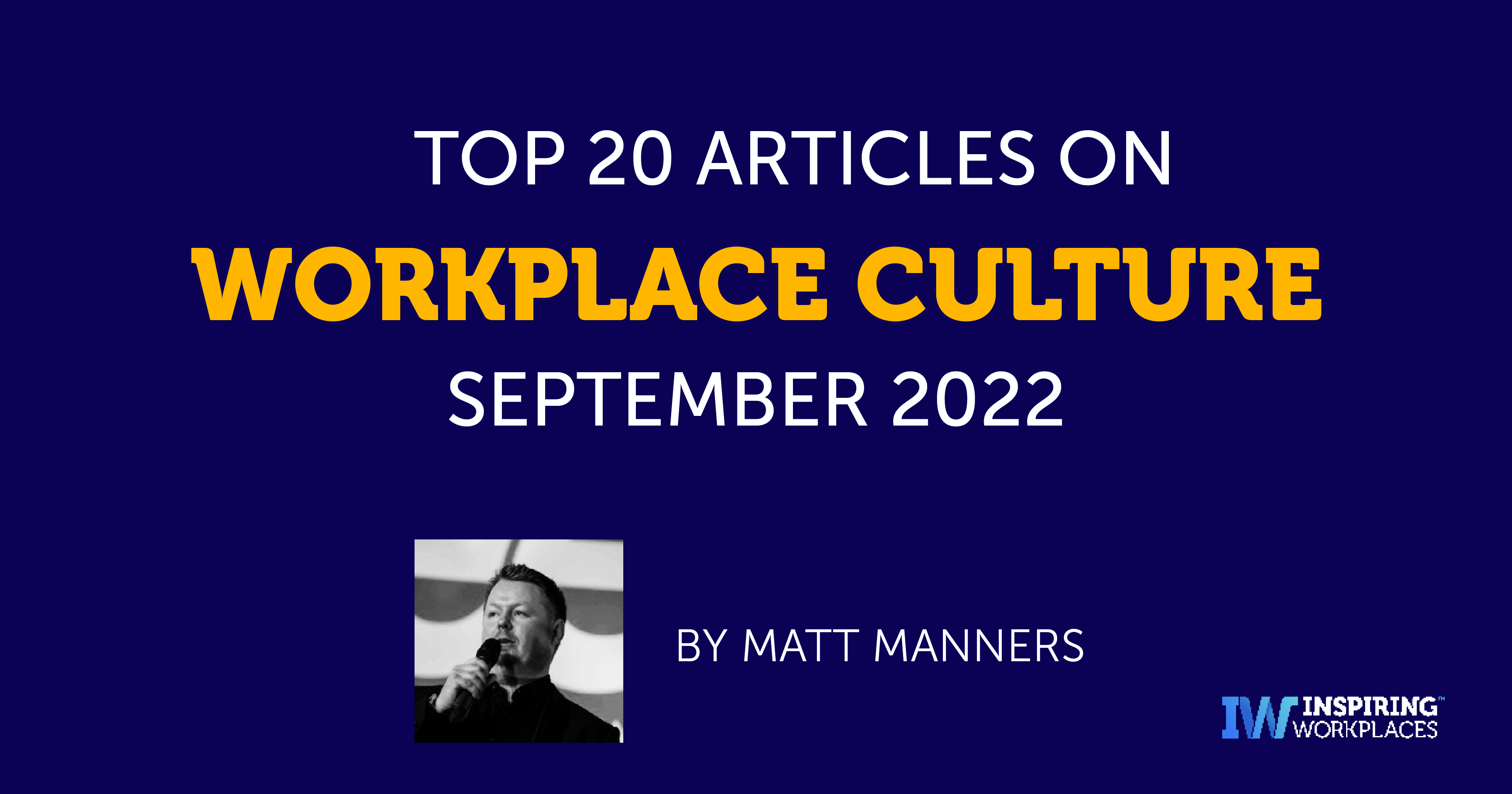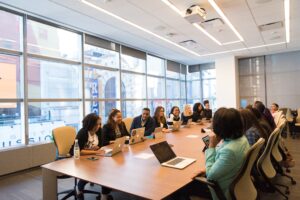
29th September 2022
Top 20 Articles on Workplace Culture for September 2022

Welcome to the Inspiring Workplaces Top 20 Articles on Workplace Culture for September 2022.
We want to help inform and inspire you from some of the best content out there. Each month we will consolidate these articles for you to help give you a quick and easy snapshot. To help drive you and your organisations forward.
The articles will be underpinned by six key elements that are reflected in our awards. They are:
- Wellbeing
- Culture
- Leadership
- Inclusion
- Employee Engagement
- Communication
Five golden rules for workplace wellbeing

Takeaways:
- According to a recent report from the Health and Safety Executive (HSE), new or long-standing work-related stress, depression, or anxiety impacted 822,000 workers in Britain in 2020/21 and accounted for half of all work-related ill health cases.
- Moreover, HSE suggests that more than 15.4 million working days are lost as a result of these three factors at a conservative estimated cost of £5.2 billion to industry, individuals and the government.
- …if every one in two work-related ill health cases is caused by stress or poor mental health, it suggests there’s an opportunity for employers to dramatically reduce absence levels if they can find ways to better manage stress in the workplace and put more measures in place to support their employees.
- Work-related stress is often caused by the poor management of workloads and expectations. It’s vital that leaders set out clear goals and that feedback is clear and constructive.
- Major issues like burnout have some quite clear signs – waning enthusiasm, reduced energy and a lack of motivation, to name a few – but only if you know to look for them.
By: Russell Goldman
Source: HR Zone
Read the full article here.
Why organisations should help staff understand pay

Takeaways:
- The government recently raised the starting national insurance threshold from £9,568 to £12,570, a move that it claims will improve the financial situation of 70% of UK workers.
- Recent research from beqom has shown that workers struggle to decode their salaries on their own and need proactive support. Its survey of 1,000 UK workers found just 42% are aware of their total remuneration package and 39% want to understand their total salary.
- …employers should lead the conversation to demonstrate they are being fair when it comes to compensation. The research by beqom found that 75% of those surveyed would be happy to discuss their pay with their manager or team lead.
By: Tanya Jansen
Source: Personnel Today
Read the full article here.
7 Reasons Why Emotional Leaders are the Future
Takeaways:
- Before COVID-19, a Verizon survey of 1,700 senior business leaders found that fewer than 20% said emotional intelligence would be vital for future business leaders. Post COVID-19, 69% of business leaders said EQ would beessential. Times are changing.
- Two economic meltdowns in 12 years? Millennials and Gen-Zers are furious, and we don’t blame them. They’re a lot less likely to trust any employer now, and a lot more likely to rely on freelance, side hustles, and the gig economy to make ends meet.
By: Sunny Bonnell & Ashleigh Hansberger
Source: Fast Company
Read the full article here.
How to take feedback
Takeaways:
- Listen! Don’t make excuses or talk about the past.
- Assume positive intent. The selfish approach for the other person would be to suppress what they really think. If someone has the guts to be frank with you, embrace it and thank them.
- Act on it. If you show you’re responsive, you’ll get more input. And you’ll get better at life and on the job.
By: Jim VandeHei
Source: Axios
Read the full article here.
Why we need a fresh approach to tackling unconscious bias in the workplace
Takeaways:
- Large companies spend significant amounts of money on EDI and unconscious bias training – up to $8bn each year in the US.
- Similarly, there has been a substantial increase in the number of diversity and inclusion-based job roles over recent years, with LinkedIn suggesting a global rise of 71 per cent from 2015 to 2020.
- The UK unemployment rate for disabled people (7.5 per cent), for example, is nearly twice the rate for non-disabled people (4 per cent).
- Unemployment of over-50s has also increased post-furlough. The Centre for Ageing Better cites the latest labour market figures showing that 355,000 over-50s are currently unemployed, with 31,000 having been made redundant between May and July 2021 alone. A recent report by the OECD found that age-diverse workforces could raise GDP per capita by almost 19 per cent in the next three decades.
By: Daniel Derbyshire
Source: People Management
Read the full article here.
How HR team members can improve sustainability in their organisations
Takeaways:
- …environmental sustainability can only be achieved if we all do our part, including HR and People leaders.
- …you can use sustainability to attract top talent to your organisation. During the onboarding process, you should also explain to each new recruit the importance of your sustainability goals and mission.
- Making use of employee ideas can boost employee engagement and help employees recognise that their suggestions can make a difference. Enable your team from every level to contribute their ideas to the organisation.
- Companies often use big words and come up with elaborate and promising values and mission statements. However, if leadership does not follow through, the sustainability strategy is unlikely to succeed. Therefore, HR team members should develop a consistent and transparent approach to prove that these words are not empty.
By: HR News Editorial Team
Source: HR News
Read the full article here.
Choose Your Words Carefully to Transform Your Mindset (and Your Success)
Takeaways:
- Our experiences lead to our beliefs; our beliefs lead to our actions; and our actions lead to our results. How we use words is one of the best indicators of our beliefs.
- Certain words predict how likely someone is to be proactive or reactive, positive or negative, and accountable or blaming. If we make the conscious choice to manage our language, it can have a major impact on our mindset — and in turn, our success.
By: Amy M Chambers
Source: Entrepreneur
Read the full article here.
How HR can help remove unconscious bias towards disabled employees
Takeaways:
- It is reported that in Q2 of 2021, there were 4.4 million disabled people in employment in the UK, an increase of 300,000 compared to Q2 in 2019 and up by 1.5 million since Q2 of 2013.
- With 80% of disabilities acquired it is very likely working people will become disabled people, and also the majority of disabilities are non-visible, so your employees already hold the identity of disabled even if they don’t acknowledge it (yet).
- Concealed bias is where you know you have bias, but you hide it, and don’t express it, while unconscious bias, as we know it, is in all of us and a natural part of being human.
By: Mary Doyle
Source: HR Zone
Read the full article here.
The Great Resignation: 86% of workers admit they have “too much work” to move during the working day
Takeaways:
- Despite growing health issues linked with consistently spending too much time seated, the report from Magic Mountain, which creates and manages wellness campaigns for workplaces, found 54% of workers remain sedentary for eight hours or more during the working day alone.
- A huge 63% of workers only go outside for 10 minutes or less during the working day.
- It isn’t just the physical issues the UK workforce is facing either. Multiple respondents reported feelings of increased stress (81%) and anxiety (75%), while a staggering 89% said their productivity is significantly impacted by tiredness and a lack of energy.
- Almost everyone we spoke to (98%) said employers have an important role to play in supporting their wellbeing, while 64% would find another job if they didn’t feel their wellbeing was supported at work. Despite this, only 44% of companies have a wellbeing strategy in place.
By: HR News Editorial Team
Source: HR News
Read the full article here.
How to Build Trust and Engagement with Remote Employees

Takeaways:
- According to LinkedIn, a whopping 80% of Gen Z employees wouldn’t think twice about leaving an employer within six months of their hire date if they find a new opportunity that aligns with their passion.
- As soon as employees feel they aren’t trusted, they are more likely to let their productivity slide, and morale follows suit.
- Successful and inspiring managers today aren’t printing reports on employee performance. They’re taking the time to understand and empathize with employees as human beings.
By: Jim Stroud
Source: Proactive Talent
Read the full article here.
Resilient Organizations Make Psychological Safety a Strategic Priority
Takeaways:
- ..organizations need to look beyond individual well-being and make psychological safety a strategic priority, creating a culture where employees can comfortably raise concerns, contribute ideas, and share unique perspectives.
- Three cultural dimensions are critical for resilience: integrity, innovation, and inclusion.
By: Maren Gube and Debra Sabatini Hennelly
Source: Harvard Business Review
Read the full article here.
Dealing with grief in the workplace: helping you and your people cope with the ultimate taboo
Takeaways:

- The standard HR policy, which allows the bereaved some immediate leave for their loss, is, at times, a very blunt instrument.
- We are all different, and death affects individuals in a myriad of ways. Some will seek to ignore the situation and keep on working, as if nothing has happened. Others may break down completely, to a point where attendance at work becomes impossible.
- There is no way of telling what will happen and, most importantly, there is no right or wrong answer. This means organisations must develop a flexible approach, based very much around talking to the affected person or people.
By: Pete Mallon
Source: Proactive Talent
Read the full article here.
Which One Doesn’t Belong? How to Foster Belonging in the Workplace
Takeaways:
- One of the most impactful strategies companies can utilize in the workplace is the power of belonging. As human beings, we are hardwired to motivate ourselves towards connection. In fact, recent research by neuroscientists suggests that social needs such as belonging are actually managed by the same neural networks as our basic needs, such as food and water.
- It’s rooted in positive relationships, interpersonal connections and interestingly, it does not depend on participation with or proximity to others or groups. Instead, a sense of belonging stems from the satisfaction, quality and meaning that we derive from our social connections.
- While it may seem easier for employers to take the easy route, and overlook sentiments of workplace belonging, the consequences of doing so can be detrimental to the health and wellbeing of the overall corporation. It can also become financially costly. Research shows that employees are more likely to resign from a workplace, because they do not feel as if they belong there.
- In my 2022 Workplace Belonging Study, commissioned by Ipsos, research showed that one in four women feel lonely at work. Further, less than half of Americans felt comfortable sharing their opinions or thoughts without fear of negative consequences.
By: Spark Team
Source: ADP
Read the full article here.
Feeling like you’re bad at your job is miserable. Worse, it’s also more likely to lead to professional burnout.
Takeaways:
- Imposter syndrome is a known issue among professionals. But researchers are increasingly interested between imposter syndrome and that other modern career malaise: burnout.
- Imposter syndrome (IS) – also called imposter phenomenon – manifests differently in different people, but commonly leaves someone with the unshakeable belief they are an intellectual fraud, despite all evidence to the contrary.
- Studies suggest up to 70% of people have experienced imposterism at work at some point. While some research suggests IS might sometimes help motivate people to achieve, there is also ample evidence that the stress it generates can be so draining that it places intense pressure on mental health.
- …a recent international survey of 10,000 knowledge workers by US-based work-management platform Asana showed 42% believed they had experienced both IS and burnout at the same time.
- …recent year-long study of 2,000 workers in the UK and US found that 62% of people struggled with feelings of imposterism on a daily basis, and 18% described themselves as being “on their knees” from stress. Based on their responses to a series of assessment questions, 34% of respondents were judged to be at high risk of imminently burning out.
By: Anna Jones
Source: BBC
Read the full article here.
Gen Z and the end of work as we know it
Takeaways:
- The future workforce depends on Gen Z. It is the one-click, all-digital generation, growing up in a borderless world. And, by 2025, 27%of the workforce in OECD countries will be Gen Z.
- Gen Z — seen as those born from the late 90s to early 2010s — value salary less than any other generation and see remote work as a top priority. They are also the most diverse, with the Census Bureau projecting this generation will be majority non-white by 2026.
- Gen Z has a keen eye on work-life balance. A recent study sampling 35,000 workers across 34 markets, found that almost two in four Gen Z individuals would prefer to be unemployed over being stuck in a job they don’t like.
- 73% of employees now desire permanent flexible work options, while 67% of employees want more in-person work and collaboration post-pandemic. Ultimately, what employees want across the board is the best of both worlds. For younger people especially, flexibility is key.
By: Kathy Bloomgarden
Source: World Economic Forum
Read the full article here.
Is workplace stigma around mental health struggles changing?
Takeaways: 
-
- 51% of respondents to a seven-country survey published by the International Committee of the Red Cross in October 2020 said the pandemic had negatively impacted their mental health.
- Figures gathered by the US Census Bureau and published in April 2021 showed that adults with recent symptoms of an anxiety or depressive disorder increased from 36% in August 2020 to 42% in February 2021.
- Among British workers, 32% feel more comfortable talking about their workplace mental health since the pandemic, compared to 14% in mid-2019, according to the social enterprise Mental Health First Aid England.
- It’s a similar story in the US, where the American Psychiatric Association found that 51% of workers were comfortable talking openly about mental health with their supervisor or co-workers in April 2019, which increased to 65% in September 2019. This indicates unprecedented progress for an unprecedented time.
By: Megan Carnegie
Source: BBC
Read full article here.
Office Life Doesn’t Have to Go Back to How It Used to Be
Takeaways:
- As workers across the world head back to the office all or part of the time, Jenna Butler, the lead researcher on the hybrid diaries study, has a radical proposal: What if we took the flexibility we’ve come to love in remote work back to the office?
- “It requires creating a culture where it’s understood that people might look different or be coming in at different hours, and that’s okay,” Butler says. “We need to let go of all of those long-held beliefs—that professionalism requires hard pants, that dedication is measured through hours at a desk—“because they haven’t been serving us.”
- According to Microsoft’s 2022 Work Trend Index, 80 percent of workers said they were just as or more productive since going remote or hybrid.
- A famous study of British civil service workers found that employees in the lowest levels of government—those with the least control over their days—had higher stress and rates of illness than their counterparts above them on the hierarchy with more control.
- Think of it as measuring outputs versus inputs: Do you ultimately care about how many hours an employee worked, how many emails they sent? Or do you judge their work based on what they delivered: how many ads they sold, how many reports they wrote, and how influential they were?
- One of the top reasons people quit their jobs recently, according to Microsoft’s 2022 Work Trend Index, was a lack of flexibility. More than half of workers in a survey from professional services firm EY said they would resign if they weren’t given some form of flexibility at work.
By: Chris Capossela
Source: Microsoft
Read the full article here.
67% of employees demand that we become more sustainable according to new study
Takeaways:
- Research conducted by BusinessWaste.co.uk has discovered that over two thirds (67%) of employees demand that we become more sustainable.
- The survey highlights that 84% of workers reported that their workplace is not doing enough to address climate change.
- Whilst 62% of workers said they would be more likely to work for a company with strong environmental policies.
- And nearly half (48%) said that they would take a pay cut to work for a company that is environmentally responsible.
By: HR News Editorial Team
Source: HR news
Read the full article here.
Four-day work week ‘no longer dream’ with 86% of trial firms wanting to keep it
Takeaways:
- More than 3,300 workers in 73 companies that include banks, retailers, healthcare, hospitality and more agreed to take part in the trial from June to November.
- A thumping 86% said they’d consider keeping the four-day workweek policy beyond the trial period and 88% of employers said the scheme is working ‘well’.
- Nearly half said productivity has ‘maintained around the same level’, while 34% said it ‘improved slightly’ and 15% reported it ‘improved significantly’.
- In Iceland, similar trials were considered an ‘overwhelming success’ with 86% of the country’s workforce now having shorter workweeks or gaining the right to.
By: Josh Milton
Source: Metro
Read the full article here.
Resilience Is About How You Recharge, Not How You Endure
Takeaways:
- According to the authors, working adults have a fundamental misunderstanding of what it means to be resilient. Yes, resilience involves working hard, but it also requires one to stop, recover, and then begin the hard work again.
- Recovery is key to maintaining good health, but also preventing lost productivity. To build resilience, you need to be willing to stop.
- Research has found that there is a direct correlation between lack of recovery and increased incidence of health and safety problems.
- And lack of recovery — whether by disrupting sleep with thoughts of work or having continuous cognitive arousal by watching our phones — is costing our companies $62 billion a year (that’s billion, not million) in lost productivity.
- In a study released last month, researchers from Norway found that 7.8% of Norwegians have become workaholics. The scientists cite a definition of “workaholism” as “being overly concerned about work, driven by an uncontrollable work motivation, and investing so much time and effort to work that it impairs other important life areas.”
- Homeostasis is a fundamental biological concept describing the ability of the brain to continuously restore and sustain well-being. Positive neuroscientist Brent Furl from Texas A&M University coined the term “homeostatic value” to describe the value that certain actions have for creating equilibrium, and thus wellbeing, in the body. When the body is out of alignment from overworking, we waste a vast amount of mental and physical resources trying to return to balance before we can move forward.
- ..you can take a cognitive break every 90 minutes to recharge your batteries. Try to not have lunch at your desk, but instead spend time outside or with your friends — not talking about work. Take all of your paid time off, which not only gives you recovery periods, but raises your productivity and likelihood of promotion.
By: Shawn Achor & Michelle Gielan
Source: HBR
Read the full article here.
For more articles on Wellbeing, Culture, and Experience & Engagement be sure to visit the Inspiring Workplaces website.
Are you an inspiring leader? Do you know an inspiring leader? Then register here for Inspiring Leaders 2022.
Join our community here, for free.

